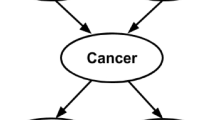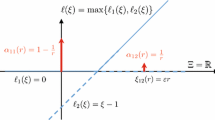Abstract
The problem of decision theoretic online learning is discussed. There is the set of methods, experts, and algorithms capable of making solutions (or predictions) and suffering losses due to the inaccuracy of their solutions. An adaptive algorithm whereby expert solutions are aggregated and sustained losses not exceeding (to a certain quantity called a regret) those of the best combination of experts distributed over the prediction interval is proposed. The algorithm is constructed using the Fixed-Share method combined with the Ada-Hedge algorithm used to exponentially weight expert solutions. The regret of the proposed algorithm is estimated. In the context of the given approach, there are no any stochastic assumptions about an initial data source and the boundedness of losses. The results of numerical experiments concerning the mixing of expert solutions with the help of the proposed algorithm are presented. The strategies of games on financial markets, which were suggested in our previous papers, play the role of expert strategies.
Similar content being viewed by others
References
V. V. V’yugin and V. G. Trunov, “Applications of combined financial strategies based on universal adaptive forecasting,” Autom. Remote Control 77, 1428–1446 (2016).
V. V. V’yugin and I. A. Stel’makh, “Tracking the best expert trajectory with the help of the AdaHedge algorithm,” Information Technologies and Systems 2016, 40th Interdisciplinary Conference and School, September 25–30, Repino, St. Petersburg, Russia (http://itas2016.iitp.ru/pdf/1570282312.pdf).
O. Bousquet and M. K. Warmuth, “Tracking a small set of experts by mixing past posteriors,” J. Machine Learning Res. 3, 31–47 (2003).
N. Cesa-Bianchi and G. Lugosi, Prediction, Learning, and Games (Cambridge Univ. Press, Cambridge, 2006).
Y. Freund and R. E. Schapire, “A decision-theoretic generalization of on-line learning and an application to boosting,” J. Comput. Syst. Sci. 55, 119–139 (1997).
I. Herbster and M. Warmuth, “Tracking the best expert,” Machine Learning 32 (2), 151–178 (1998).
N. Littlestone and M. Warmuth, “The weighted majority algorithm,” Inf. Comput. 108, 212–261 (1994).
S. de Rooij, T. van Erven, D. Grunwald, and M. Koolen, “Follow the leader if you can, hedge if you must,” J. Machine Learning Res. 15, 1281–1316 (2014).
V. Vovk, “Aggregating strategies,” in Proc. 3rd Ann. Workshop on Comput. Learning Theory, San Mateo, CA, 1990 (Morgan Kaufmann, 1990), pp. 371–383.
V. Vovk, “A game of prediction with expert advice,” J. Comput. Syst. Sci. 56, 153–173 (1998).
V. Vovk, “Derandomizing stochastic prediction strategies,” Machine Learning 35, 247–282 (1999).
V. V’yugin and V. Trunov, “Universal algorithmic trading,” J. Investment Strategies. Winter 2012/13 2 (1), 63–88 (2013).
V. V. V’yugin, “Universal Algorithm for Trading in Stock Market Based on the Method of Calibration,” Lecture Notes in Artificial Intelligence (LNAI), 8139, 53–67 (2013).
V. V. V’yugin, “The following the perturbed leader algorithm and its application for constructing game strategies,” J. Commun. Technol. Electron. 60, 647–657 (2015).
Author information
Authors and Affiliations
Corresponding author
Additional information
Original Russian Text © V.V. V’yugin, I.A. Stel’makh, V.G. Trunov, 2016, published in Informatsionnye Protsessy, 2016, Vol. 16, No. 3, pp. 260–280.
Rights and permissions
About this article
Cite this article
V’yugin, V.V., Stel’makh, I.A. & Trunov, V.G. Adaptive Algorithm of Tracking the Best Experts Trajectory. J. Commun. Technol. Electron. 62, 1434–1447 (2017). https://doi.org/10.1134/S1064226917120117
Received:
Published:
Issue Date:
DOI: https://doi.org/10.1134/S1064226917120117




